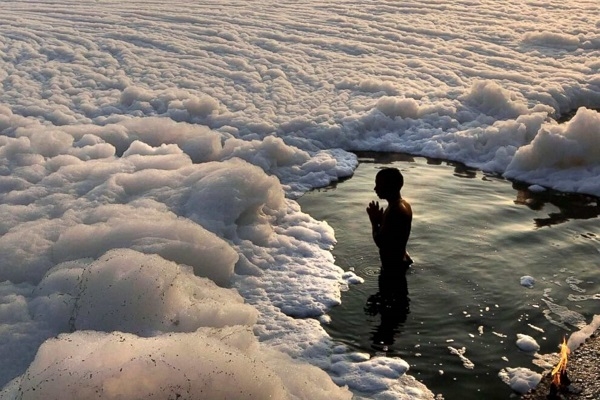Reports say no fresh water in river Yamuna, except during monsoon
19 Mar 2021 12:45:43
New Delhi, Mar 19: The Yamuna River has almost no fresh water, downstream of Wajirabad barrage in Delhi, except during the monsoon season. There is a critical path of 22 km of river Yamuna in Delhi where 18 major drains discharges into River Yamuna.

Also read: NIO Launches Project to map Genetic Diversity in the Indian Ocean
According to the report of the Delhi Pollution Control Board (DPCB) published in Jan 2021, the estimated sewage generation in Delhi is about 3273 Million litres per day (MLD) (720 MGD), while installed sewage treatment capacity is about 2715 MLD (597 MGD), out of which about 2432 MLD (535 MGD) sewage is being treated in Delhi. Thus, about 941 MLD (185 MGD) of sewage is finding its ways in river Yamuna through various drains.
Besides, as per the report, 13 Common Effluent Treatment Plants (CETPs) of 212 MLD capacity exist for 17 industrial clusters in Delhi are non-compliant. The Bio-chemical Oxygen Demand (BOD) of river Yamuna at Palla, which is the entry point for the river in Delhi, is about 2.0 mg/l which falls in Class B (outdoor bathing) as per designated best use of water by Central Pollution Control Board (CPCB). The BOD of river Yamuna in the Delhi stretch increases to 4.8-40 mg/l downstream of Wajirabad barrage to Okhla, which indicates that the sewage treatment capacity is not sufficient in the city.
Presently in Delhi, under the Namami Gange Programme, a total of 13 projects have been taken up with a sanctioned cost of Rs 2419 crore to lower the pollution in river Yamuna. These projects are at various stages of implementation and through these projects, a total of 1384.5 MLD (304 MGD) sewage treatment capacities will be created in Delhi. The directions were issued by the Ministry of Jal Shakti to Delhi Pollution Control Committee (DPCC) in Aug 2018, under Section 5 of Environment (Protection) Act, 1986 against sub-optimal functioning of CETPs as well as reutilization of treated waste water in the region of Delhi. In addition, as per the report of CPCB, directions were also issued to Delhi Jal Board (DJB), under the said Act against non-complying sewage treatment plants operating in Delhi.
Also read: Indian Oil, Israeli Firm Phinergy Form JV To Manufacture Aluminium-Air Batteries In India
The matter of increased pollution levels in river Yamuna due to discharge of pollutants, as petitioned by the Delhi Jal Board, has been taken up as Suo Moto Writ Petition ‘Remediation of Polluted Rivers’ by the Supreme Court of India and the matter is being heard currently.